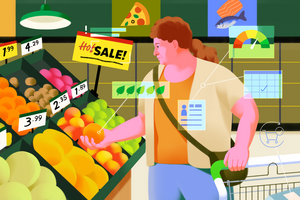Finance & Accounting Dec 1, 2024
Online Sports Betting Is Draining Household Savings
Most impacted are the bettors who can least afford it, new research shows.

Jesús Escudero
These days, U.S. sports fans no longer need to travel to Las Vegas to bet on March Madness, the Super Bowl, or the Kentucky Derby. They can do so from the comfort of their home.
When the Supreme Court in 2018 struck down the federal law that prohibited sports gambling, then-CEO of the American Gaming Association, Geoff Freeman, proclaimed the expanded betting market would both raise revenue and protect consumers.
The first point stands uncontested: sports gambling, which is now available in the majority of American states, generated $120 billion in total bets and $11 billion in revenue for firms across the U.S. in 2023 alone—the vast majority of this online. But the second point merits more scrutiny and is the subject of recent research by Kellogg’s Scott Baker, an associate professor of finance.
With colleagues Justin Balthrop and Kevin Pisciotta of the University of Kansas, and Mark Johnson and Jason Kotter of Brigham Young, Baker studied the state-by-state rollout of online sports gambling and its impact on household spending from 2018 to 2023.
Specifically, they asked, if consumers are spending more on online sports gambling, on what are they spending less?
The answer wasn’t immediately obvious. For example, it was possible that the rise of sports betting was coming at the expense of other forms of entertainment, like concerts or dining at restaurants. It was also possible that legalized sports betting would encourage people to spend less on other forms of gambling—and maybe even be financially beneficial overall.
“If sports betting displaced other forms of gambling, like lotteries, then it could possibly be better for consumers,” Baker says. “On average, sports betting tends to have significantly negative expected payouts but still better than most lotteries, which is very negative for everybody except for the ten-in-a-billion who win grand prizes.”
By and large, however, the research shows that the hundreds of billions of dollars that consumers pour into online sports betting overwhelmingly come from money that used to be spent on more stable, long-term investments, like retirement accounts. This trend is particularly pronounced in financially constrained households.
“In general, as entertainment and gambling spending goes up, bad things happen for people’s budgets in other places,” Baker says. “Net savings decline, and we see more indicators of financial fragility.”
Differences in spending behavior
For their research, Baker and colleagues took advantage of the staggered rollout of legalized online gambling between 2018 and 2023, during which 25 states and Washington D.C. gradually passed legislation to allow online sports betting.
“If you’re a person who really likes spending today at the expense of long-term savings, then you’re more likely to be financially constrained and also more likely to be interested in gambling.”
—
Scott Baker
The researchers gathered financial information from a database of transactions recorded by financial institutions (major banks, credit-card companies, and FinTech firms) for over 60 million Americans. They focused on a randomized subset of roughly 230,000 households. They also aggregated data by quarters—a total of 4.9 million observations—and analyzed household-level income, spending, and investing, including money deposited into online sports betting platforms like FanDuel and DraftKings.
Taken together, this data allowed the researchers to compare household-level spending and investing for a wide range of transactions in states with legal sports gambling and those without it. And by looking at the variation in spending over time, they were able to identify how the legalization of sports gambling affected many aspects of household budgets.
Following the money
At the outset, the researchers observed a sharp increase in sports betting in the states where it was legalized.
“The figure goes from zero in most states to sizable amounts, and it continues to increase for several months as people learn about it,” Baker says. “Only a year or two after it’s been introduced do we see a bit of a plateau, and this is at a pretty high level in terms of money spent and people involved.”
By the end of their sample period, the researchers saw that nearly 8 percent of households were involved in gambling. These bettors spent, on average, $1,100 per year on online bets. While the amount of money people put into legal sports gambling rose, their net investments fell by nearly 14 percent. For every $1 a household spent on betting, it put $2 fewer into investment accounts.
The researchers also found that this greater access to sports gambling increased general participation in lottery games, particularly among households that frequently overdraw their bank accounts. This, they note, raises concerns about the amplification of risk-taking behavior.
Beyond this, sports gambling also led to increased spending on cable TV, restaurants, and other forms of entertainment—possibly, the researchers speculate, driven by a greater engagement with live sporting events.
Overall, these changes to people’s spending patterns led to decreased credit availability, increased credit-card debt, and a higher incidence of overdrawing from bank accounts. The researchers note that the effects were particularly acute among households that were least able to afford it, pushing them even deeper into debt.
“If you’re a person who really likes spending today at the expense of long-term savings, then you’re more likely to be financially constrained and also more likely to be interested in gambling,” Baker says. “These are the people who are looking for the big win at the expense of savings.”
An open question for policymakers
Baker notes that these spending patterns could be the result of rational decision-making. Perhaps the thrill of the bet is enough to justify the drawdown in long-term savings.
However, there may be reasons to believe sports gambling by households is subject to irrational behavior. For example, many of the “true” odds for a variety of sports bets are unknown, as opposed to the formulaic odds found in other types of gambling like lotteries, slot machines, or card games. Many of the most popular types of sports bets, which chain together individual events for combined payouts, tend to have much larger loss ratios than straight bets on wins and losses. More transparency in the sports betting world, where people often take these exotic bets with bad odds, could be an important step in assuring these decisions are well-informed, Baker says.
He raises two other important considerations for policymakers. First, at the same time many states have legalized sports gambling, they have also created incentives for citizens to save more money for retirement or participate in relatively safe investment markets. These two directives, he notes, are “in direct tension with each other.” Policymakers should be aware of this: money that goes toward gambling is being pulled away from savings.
Second, the vast majority of this money comes from online betting—where people can place bets by pushing a few buttons on their phone while lying in bed at two in the morning. “If we’re worried about people acting impulsively, then one lever that would move the needle would be to make all sports betting take place on premises somewhere,” Baker says.
Dylan Walsh is a freelance writer based in Chicago.
Baker, Scott R, Justin Balthrop, Mark J. Johnson, Jason D. Kotter, and Kevin Pisciotta. 2024. “Gambling Away Stability: Sports Betting's Impact on Vulnerable Households.” Working paper.



